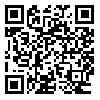پنجشنبه 18 دی 1404
[Archive]
دوره 7، شماره 2 - ( 1-1398 )
جلد 7 شماره 2 صفحات 136-125 |
برگشت به فهرست نسخه ها
Download citation:
BibTeX | RIS | EndNote | Medlars | ProCite | Reference Manager | RefWorks
Send citation to:



BibTeX | RIS | EndNote | Medlars | ProCite | Reference Manager | RefWorks
Send citation to:
Kiani A, Ramezani S, Atadokht A. Predicting Suicidality and Addictions Among University Students Based on Adverse Childhood Experiences and Exposure to Family Members’ and Friends’ Suicide. PCP 2019; 7 (2) :125-136
URL: http://jpcp.uswr.ac.ir/article-1-623-fa.html
URL: http://jpcp.uswr.ac.ir/article-1-623-fa.html
Predicting Suicidality and Addictions Among University Students Based on Adverse Childhood Experiences and Exposure to Family Members’ and Friends’ Suicide. Practice in Clinical Psychology. 1398; 7 (2) :125-136
چکیده: (5429 مشاهده)
Objective: This research aimed to predict suicidality and addiction (substance, alcohol, cigarette, psychoactive drugs) among university students based on Adverse Childhood Experiences (ACEs) and exposure to the suicide of family members and or friends.
Methods: The research method was cross-sectional. The statistical community included all students of the University of Mohaghegh Ardabili, Ardabil City, Iran, in 2018. A sample of 500 people was selected through convenience sampling method. The obtained data were analyzed by descriptive statistics indices, the Pearson correlation, and regression analysis in SPSS V. 23. The study measures included depressive symptom-suicidality subscale, adverse childhood experiences, substance, alcohol, cigarette, psychoactive drugs abuse, and exposure to suicidal behavior.
Results: The findings show a significant correlation between ACEs and suicide, substance, alcohol, cigarette, psychoactive drugs abuse. In addition, there was a significant correlation between the person’s suicide and exposure to the suicide of a friend and or a family member. Exposure to friends’ suicide had a significant correlation with substance, alcohol, cigarette, and psychoactive drugs abuses, but there was no significant correlation between exposure to family members’ suicide and addictions. Moreover, in the predicting variables, findings showed that ACEs can predict both suicide (r=0.322) and addictions; cigarette smoking (r=0.244), alcohol consumption (r=0.216), substance abuse (r=0.180) and street drugs (r= 0.172). However, exposure to friends’ and family members’ suicide did not have this predicting power.
Conclusion: Adverse childhood experiences play an important part in suicidality and addiction, and we should prevent these experiences by working on the family.
Methods: The research method was cross-sectional. The statistical community included all students of the University of Mohaghegh Ardabili, Ardabil City, Iran, in 2018. A sample of 500 people was selected through convenience sampling method. The obtained data were analyzed by descriptive statistics indices, the Pearson correlation, and regression analysis in SPSS V. 23. The study measures included depressive symptom-suicidality subscale, adverse childhood experiences, substance, alcohol, cigarette, psychoactive drugs abuse, and exposure to suicidal behavior.
Results: The findings show a significant correlation between ACEs and suicide, substance, alcohol, cigarette, psychoactive drugs abuse. In addition, there was a significant correlation between the person’s suicide and exposure to the suicide of a friend and or a family member. Exposure to friends’ suicide had a significant correlation with substance, alcohol, cigarette, and psychoactive drugs abuses, but there was no significant correlation between exposure to family members’ suicide and addictions. Moreover, in the predicting variables, findings showed that ACEs can predict both suicide (r=0.322) and addictions; cigarette smoking (r=0.244), alcohol consumption (r=0.216), substance abuse (r=0.180) and street drugs (r= 0.172). However, exposure to friends’ and family members’ suicide did not have this predicting power.
Conclusion: Adverse childhood experiences play an important part in suicidality and addiction, and we should prevent these experiences by working on the family.
نوع مطالعه: پژوهشي |
موضوع مقاله:
رويكرد شناختي رفتاري
دریافت: 1397/6/30 | پذیرش: 1397/11/19 | انتشار: 1398/1/12
دریافت: 1397/6/30 | پذیرش: 1397/11/19 | انتشار: 1398/1/12
| بازنشر اطلاعات | |
 |
این مقاله تحت شرایط Creative Commons Attribution-NonCommercial 4.0 International License قابل بازنشر است. |



